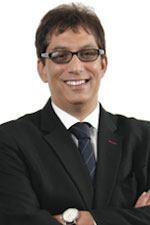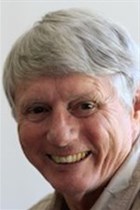
Top stories






More news


Marketing & Media
Ads are coming to AI. Does that really have to be such a bad thing?













"Survé's defining reaction is of irritation" Ferial Haffajee, City Press 22/12/2013
In swift succession, two of the three senior journalists at the Cape Times whose front page tribute to Nelson Mandela on 6 December last year received an accolade from TIME magazine - which pronounced it as one of the best in the world - have received further honours.
A month ago Tony Weaver received the Standard Bank Sikuvile Journalism Award in the editorial/columns category for three columns which outlined how that Nelson Mandela obituary was put together under difficult conditions and tension-filled time constraints by the team led by then editor, Alide Dasnois, and her deputies, Janet Heard and himself. Subsequent columns by Weaver defended this team and led, according to Gill Moodie to " ...an extraordinary assault on the remaining leadership of the Cape Times and of Independent Newspapers in Cape Town by a motley crew of either previously unheard of defenders of press freedom or commentators with dubious recent histories."

The departure of Dasnois was followed by the departure of outstanding senior journalists who between them probably had a century of institutional knowledge of a once-respected newspaper. In addition to Dasnois, Chris Whitfield, Janet Heard, Ann Crotty and Terry Bell are now also lost to the newspaper. So, too, is the suspended Donwald Pressly, whose outstanding new book, Owning the Future: Lindiwe Mazibuko and the Changing Face of The DA is eloquent testimony to his talent as a wordsmith and his knowledge of our politics. But it was not just the veterans who are leaving. Two months ago one of the brightest young talents at Newspaper House, crime reporter Caryn Dolley, joined The Times and another, Zara Nicholson who covers the important municipal beat, leaves at the end of the month.
Why the sudden exodus?
In the Cape Times Weaver's award was covered with a few sentences.
Last week however, that was taken a step further at the Nat Nakasa Award ceremony in Cape Town where Deputy President Cyril Ramaphosa was the keynote speaker.
According to the SANEF website: The Nat Nakasa Award is awarded annually by Print Media SA, the SA National Editors' Forum, and the Nieman Society in recognition of any media practitioner - journalist, editor, manager or owner - who has:
• Shown integrity and reported fearlessly
• Displayed a commitment to serve the people of South Africa
• Tenaciously striven to maintain a publication or other medium despite insurmountable obstacles
• Resisted any censorship
• Shown courage in making information available to the South African public
• Any combination of the above
Drum editor Khosi Zwane-Siguqa avers that when Alide Dasnois was announced as the winner, Iqbal Survé appeared to become upset: "Alide received the award on Friday night and gave a short speech. The whole audience gave her a standing ovation.
"After that, Iqbal took a big sip of water from the glass in front of him, stood up and said: 'I can't believe it. It's bulls**t!'
"He walked to Deputy President Cyril Ramaphosa and whispered something in his ear, before storming out."
However, according to the Hogarth column in the Sunday Times two days after the event, Survé is quoted in the column as saying: "Absolutely not. I left due to a prior engagement that I had to attend."
In February Ann Crotty gave a succinct and cogent response when asked why she was leaving: "The decision was the result of a troubling sequence of events. While I acknowledge the rights of owners, I think the balance between the rights of the owners, the rights of readers and the rights of journalists has slipped out of kilter at the Independent Group.
"If you look at what is been happening at Independent, there is a sense that we - the journalists - might be too concerned with the views of the Chairman. My decision to leave is largely motivated by the fact that we shouldn't be writing for the Chairman and the owners. We should be writing for our current readers as well as readers we hope to attract."
The most pressing concern in South Africa at the moment is the Amcu strike and the role it has played in the downgrading of our credit rating by Fitch and Standard & Poor.
When asked for a response, Gwede Mantashe is reported to have said latter. "The articulation of the Amcu position by white foreign nationals, signalling interest of foreign forces in the destabilisation of our economy."
It turns out that he was referring to a petite woman, married to a South African national and heavily pregnant with her third child. We gleaned from a Carte Blanche interview on June 22 that she represents a political party that has 10,000 members compared to the 11.5 million of the ANC. She works in a small office in downtown Johannesburg, walks to work unaccompanied by a phalanx of bodyguards and is so committed to this country and its future that she did not merely learn Zulu but majored in it when she received a BA from the University of KZN.
When Liv Shange described Mantashe's crude characterisation of her as "disgraceful", the Cape Times said in a single sentence in an editorial on 11 June.
"And ANC secretary Gwede Mantashe is right to say the strike is political. The shop floor and the mine shaft have been the theatre of struggle ever since various colonial and apartheid governments passed laws to usurp native lands to force people to work at white-owned mines and factories."
Kevin Keeton of Business Day had a different take on the Amcu strike and its causes:
"At the heart of the conflict is a chasm between what workers believe they should earn and what their employers believe they can afford to pay. The unions do not believe employers that their offer represents the most that can be added to the wage bill without threatening operations. This distrust is compounded by the struggle for supremacy between rival unions, the National Union of Mineworkers (NUM) and the Association of Mineworkers and Construction Union. And the government is rejected as the 'honest broker' because of the African National Congress's alliance with the NUM."
Perhaps that is the sort of interpretive journalism to which the Cape Times should aspire.
On the Sekunjalo website, Iqbal Survé is "... an influential African entrepreneur, a global business leader and a recognized philanthropist. He is the recipient of numerous and significant awards for business excellence and business performance and has been recognized by authoritative African magazines as one of the most influential business leaders that will 'shape the future of the African continent'".
Furthermore, he is "... an inspiration to other Africans" and "... an example of someone who has shown outstanding moral leadership in the face of numerous challenges."
Koos Bekker, on the other hand says "We screwed up frequently, but we had a great deal of fun and I couldn't imagine another job that would have fitted my limited talents better, that would have given me more pleasure."
If Iqbal Survé can make the Cape Times a neutral and objective newspaper that maintains the standard which saw the Madiba obituary wrap recognised by TIME as one of the best in the world and if he can improve the material lot of its staff as he would surely want to, then the accolades will come of their own accord and they will be richly deserved.
